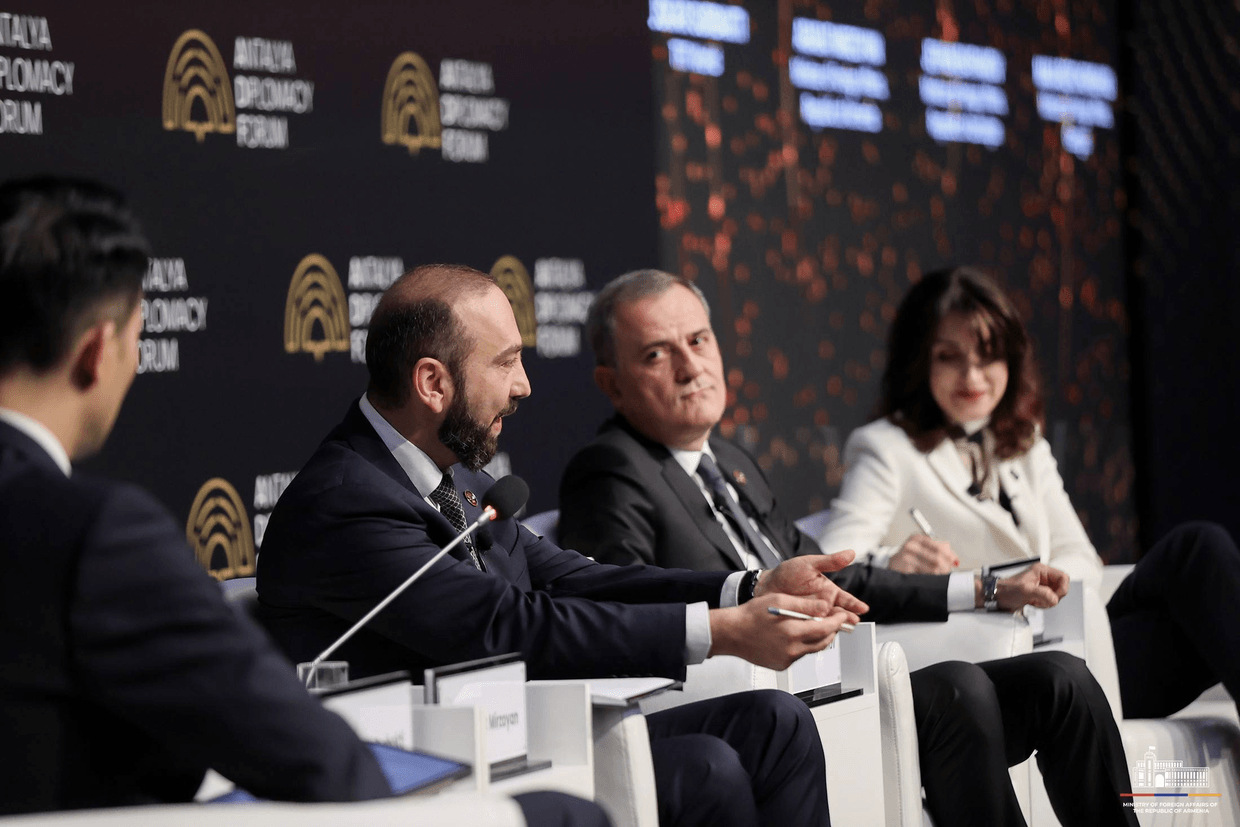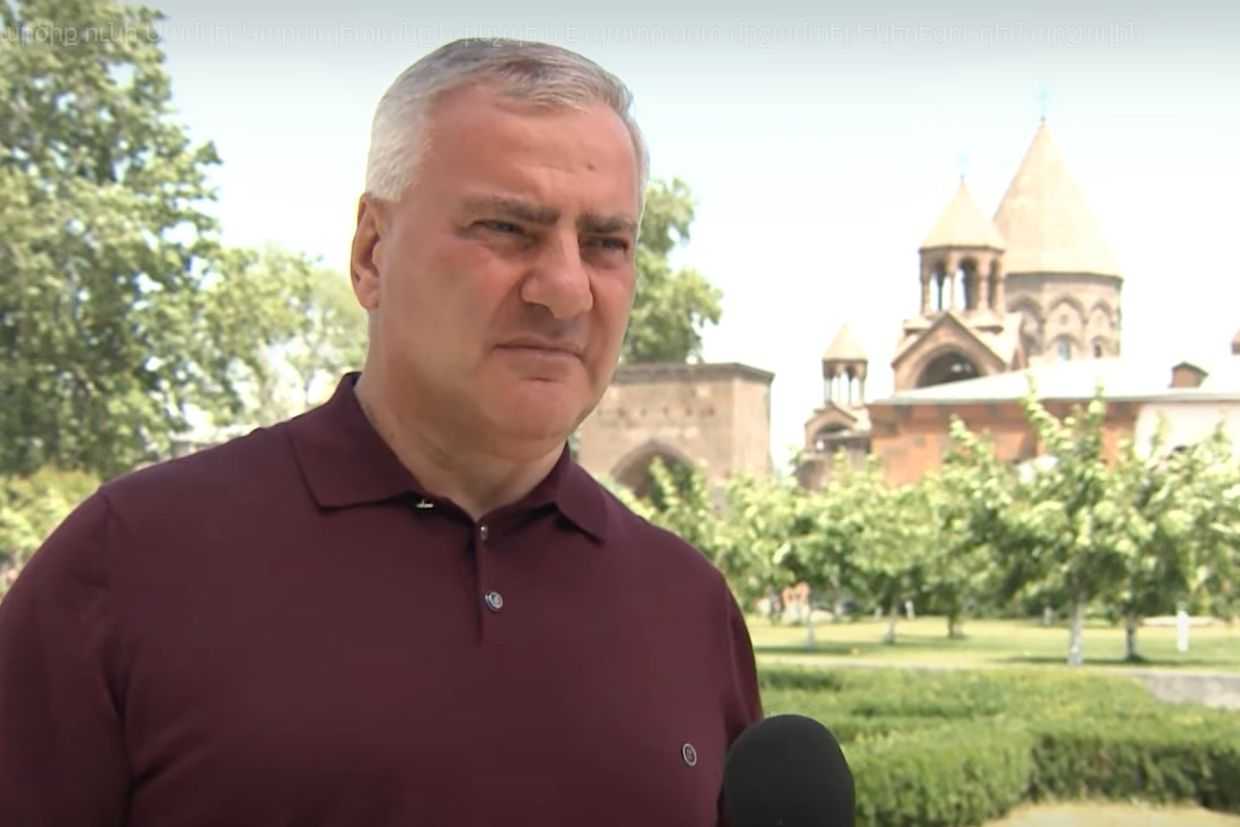Yerevan discusses normalisation with Ankara and Baku in the scope of the Antalya Diplomacy Forum

On 12 April, Armenian Foreign Minister Ararat Mirzoyan and his Azerbaijani counterpart Jeyhun Bayramov met on the sidelines of the Antalya Diplomacy Forum, after which they discussed the signing of the peace treaty and the preconditions pushed by Azerbaijan in a panel discussion. The forum also saw meetings focused on Armenia’s normalisation process with Turkey.
This year marked Armenia’s third participation in the forum hosted by the Turkish Foreign Ministry. The fourth edition of the forum was held from 11–13 April, under the theme of Reclaiming Diplomacy in a Fragmented World.
It was the first meeting between Mirzoyan and Bayramov since 13 March, when the two countries announced they had agreed on the text of the peace treaty.

According to the Armenian readout, Mirzoyan and Bayramov ‘discussed the current state of affairs in the normalisation process’ following the finalisation of the text of the peace treaty. They also ‘expressed readiness to continue the dialogue’.
During a panel discussion with the participation of the foreign ministers of the three South Caucasus countries, Armenia and Azerbaijan further elaborated on the issue.
Bayramov reiterated Azerbaijan’s two preconditions for the conclusion of the peace deal — ‘first and foremost, it involves the dissolution of the outdated and ineffective Minsk Group, as well as amendments to Armenia's constitution and the elimination of territorial claims over Azerbaijani territory’.
In the decades that followed the First Nagorno-Karabakh War in the 1990s, the OSCE Minsk Group, co-chaired by France, Russia, and the US, was the main venue for talks between the two sides.
Azerbaijani pro-government media outlet APA quoted Bayramov as saying during the discussion that signing a peace treaty without constitutional changes would be illogical, as no international agreement can contradict a country's fundamental law.
In turn, Mirzoyan expressed confidence that both sides have ‘all’ the ‘positive’ preconditions to sign the treaty, adding that no single agreement answers and covers all possible questions and issues.
He said that the peace treaty would be ‘a basis, this is a start of relations’, adding that one of the provisions of the treaty envisages the establishment of ‘a bilateral commission to discuss all the other issues, including the issues that may arise regarding the interpretation of this or that provision of the agreement’.
Mirzoyan also addressed the mentioned preconditions, by saying that Armenia and Azerbaijan ‘should sign the agreement, put an end to this conflict in an institutional way, [and] dissolve [the Minsk Structures] on the very same day’.
‘And I'm not even saying which document should be the first’, Mirzoyan said.
As for the constitution, Mirzoyan said that Armenia also has a concern regarding the Azerbaijani Constitution, however, they do not raise it continuously, as the agreed text contains several provisions addressing it.
Mirzoyan noted that currently there is ‘an unprecedented situation’, with the sides having agreed on a text of the treaty.
‘Are we going to build on this or are we going to undermine this very tangible, historic accomplishment and then bring another issue to the table of negotiations, and then another issue? It could become a never-ending process. Are we focusing on the future or on the past? This is the question’.
Armenia–Turkey relations
Aside from the Armenia–Azerbaijan peace process, the Antalya Diplomacy Forum also saw talks covering the Armenia–Turkey normalisation process.
Turkey unilaterally closed its border with Armenia in 1993. In late 2021, another round of the normalisation process between Armenia and Turkey was kicked off with the two countries appointing special representatives to hold talks.
During the forum, Mirzoyan also met his Turkish counterpart, Hakan Fidan. The Armenian side reported that the ministers discussed ‘current items in the Armenia–[Turkey] bilateral agenda. Views were exchanged also on regional and international developments’.

Additionally, on 11 April, the Armenian and Turkish Special Representatives for normalisation of bilateral relations, Ruben Rubinyan and Serdar Kılıç, respectively, met within the framework of the forum.
Rubinyan wrote on X that he had ‘a good discussion’ on the normalisation process, with Kılıç reaffirming in a separate post that the meeting was ‘indeed had a very good and productive’.
In an interview with CivilNet, Kılıç commented on the Azerbaijani demand regarding Armenia’s constitution, saying that the Armenian authorities ‘have already declared that they also want to amend their constitution, but this is a domestic issue in Armenia, and the Armenian people and Armenian institutions are going to decide how and when they are going to conduct that amendment process’.
It is unclear if this was Kılıç’s own commentary or a remark quoting the position of the Armenian side.
Also on 11 April, Turkish President Recep Tayyip Erdoğan met his Azerbaijani President Ilham Aliyev. Erdoğan’s office reported that he emphasised that Turkey ‘wishes to see Azerbaijan as the architect of peace in the South Caucasus and added that [Turkey] is carefully continuing the normalisation process with Armenia’.
In his own interview with CivilNet, Mirzoyan said that both Armenia and Turkey saw an opportunity ‘not only to establish minimal relations but also to implement very significant interstate trade, transit opportunities, and joint energy projects’.
He added that in terms of the pace of implementation of agreements reached, however, the Turkish side ‘assumes certain limitations’, conditioned by the Armenia–Azerbaijan relations, while the Armenian side had a different approach.
‘We believe that progress in the Armenia–Turkey direction will have a positive impact on the Armenia–Azerbaijan settlement’, Mirzoyan said, adding Turkey’s ‘willingness to have a useful, favorable impact’.








